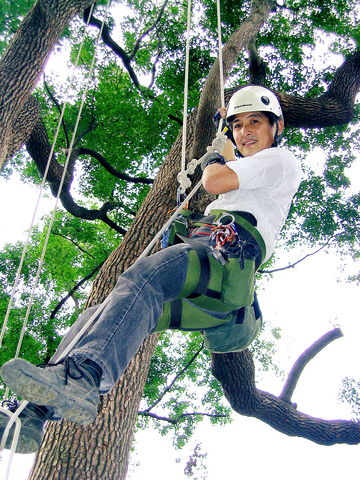For most retirees, earthbound leisurely pastimes such as golf or hiking are great ways to unwind. Retired photojournalist Elliot Su (
Dangling from a thick rope 60m above the ground with no safety net may not be everyone's idea of fun, but for Su and other members of the Tree Climbing Taiwan Association the view is always greener from the top of a towering Taiwan redwood or Japanese cedar.

PHOTO: GAVIN PHIPPS, TAIPEI TIMES
Su said that from the top of a tree you're able to get a different view of the world. "There's nothing quite like being able to see birds and insects close-up and in their natural environments," he said.
Su first became interested in the pastime after he picked up a tree-climbing magazine while holidaying in the British seaside resort Eastbourne.
He contacted the US-based association Tree Climbing International and within a few months was in Atlanta, Georgia, studying under the guidance of tree-climbing guru, Peter "Treeman"
Jenkins.
After three months extensive training, Su became a certified member of Tree Climbing International and Taiwan's first tree-climbing instructor.
Since founding the Taiwan chapter of Tree Climbing International just over a year ago, Su has taught over 1,000 recreational climbers and worked in close conjunction with universities, environmental groups and government bodies as well as charity organizations.
In order to qualify as an expert tree climber, students have to undertake a three-day extensive course focusing on the intricacies and techniques need to master tree climbing, and then must climb 25 trees of 10 different species. The course has not been adapted in any way and complies to the guidelines laid down by Tree Climbing International.
Tree climbing is not cheap and while the association loans equipment to its students, graduates wanting to go it alone have to purchase equipment specially imported from the US. Even with this equipment, which costs upwards of NT$20,000, climbers' safety is not guaranteed. Neither Su nor any of his students have fallen from a tree, but tree-dwelling creatures have attacked the tree-loving, tree-climbing retiree.
"I was trying to remove a bee's nest from a tree so that we could take a class of children up. The entomology students told me that bees don't attack after dark, but this proved incorrect," Su said. "I'd climbed into the tree and was about to remove the nest when I was stung by a single killer bee."
Within minutes of the accident Su's hand had, according to the tree-climbing expert, "turned into bread" and swollen to twice its normal size. As a result of the bee sting, Su was kept in hospital for three days, pumped with drugs and kept under close observation.
While Su and his fellow climbers ask permission before climbing any tree, be it in Wulai, Nantou or Hualien and currently only undertake inner-city climbs in a couple of Taipei parks, he does have his eyes set on a nice tree-lined stretch of downtown Taipei.
"I'd love to climb the trees along Dunhwa North and South roads. I think it would be great fun and because of the public nature of such a climb, it would be great way to introduce tree climbing and encourage people to take more notice of Taiwan's natural environment," he said.
For further information about the Tree Climbing Taiwan Association, log on to its Chinese-language website at www.treeclimbingtaiwan.org. Those interested in taking to the canopies can contact the association directly by calling (0936) 888 997 or by fax at (02) 2391 8145. Class times and other information can also be obtained via e-mail at boysu@yam.com.

Last week, on the heels of the recall election that turned out so badly for Taiwan, came the news that US President Donald Trump had blocked the transit of President William Lai (賴清德) through the US on his way to Latin America. A few days later the international media reported that in June a scheduled visit by Minister of National Defense Wellington Koo (顧立雄) for high level meetings was canceled by the US after China’s President Xi Jinping (習近平) asked Trump to curb US engagement with Taiwan during a June phone call. The cancellation of Lai’s transit was a gaudy

Following the shock complete failure of all the recall votes against Chinese Nationalist Party (KMT) lawmakers on July 26, pan-blue supporters and the Chinese Communist Party (CCP) were giddy with victory. A notable exception was KMT Chairman Eric Chu (朱立倫), who knew better. At a press conference on July 29, he bowed deeply in gratitude to the voters and said the recalls were “not about which party won or lost, but were a great victory for the Taiwanese voters.” The entire recall process was a disaster for both the KMT and the Democratic Progressive Party (DPP). The only bright spot for

From Godzilla’s fiery atomic breath to post-apocalyptic anime and harrowing depictions of radiation sickness, the influence of the nuclear bombings of Hiroshima and Nagasaki runs deep in Japanese popular culture. In the 80 years since the World War II attacks, stories of destruction and mutation have been fused with fears around natural disasters and, more recently, the Fukushima crisis. Classic manga and anime series Astro Boy is called “Mighty Atom” in Japanese, while city-leveling explosions loom large in other titles such as Akira, Neon Genesis Evangelion and Attack on Titan. “Living through tremendous pain” and overcoming trauma is a recurrent theme in Japan’s

As last month dawned, the Democratic Progressive Party (DPP) was in a good position. The recall campaigns had strong momentum, polling showed many Chinese Nationalist Party (KMT) lawmakers at risk of recall and even the KMT was bracing for losing seats while facing a tsunami of voter fraud investigations. Polling pointed to some of the recalls being a lock for victory. Though in most districts the majority was against recalling their lawmaker, among voters “definitely” planning to vote, there were double-digit margins in favor of recall in at least five districts, with three districts near or above 20 percent in